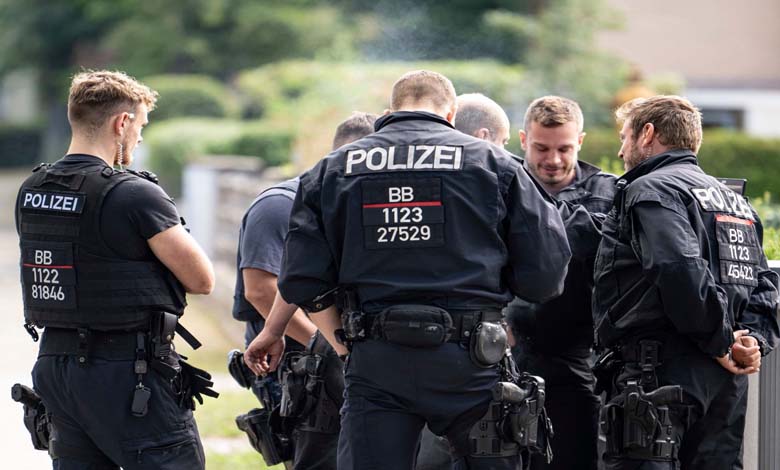After the Arrest of a Hamas Cell in Berlin: The Brotherhood’s Danger Infiltrates Europe

In one of the most significant security operations in Europe this year, German authorities announced the arrest of three individuals suspected of being linked to Hamas, after attempting to purchase weapons and ammunition to carry out attacks against Israeli and Jewish institutions on German soil. This event is not an isolated incident, but an alarming indicator of the expansion of the extremist ideology represented by Hamas, extending beyond the Middle East into the heart of Europe.
-
The Muslim Brotherhood in Europe and Youth: A Long Arm with 31 Branches and a Recruitment Strategy
-
The Muslim Brotherhood in Europe and Youth: An Extensive Arm with 31 Branches and a Structured Recruitment Strategy
Since its founding in 1987, Hamas has been presented to the world as a “resistance movement,” yet its actual record tells a completely different story — a movement founded on an extremist Brotherhood ideology that makes no distinction between politics and religion and feeds on hatred and incitement. Hamas emerged from the environment of the Muslim Brotherhood, making it an integral part of the global Brotherhood network, which seeks to spread political Islam and exploit religion for political gain, even at the cost of terrorism and violence.
In reality, the connection between Hamas and the Muslim Brotherhood is not merely historical or ideological, but also organizational and strategic. The ideology upon which Hamas was built mirrors that of the Brotherhood: promoting the establishment of an “Islamic state” by any means necessary, including violence. This ideology, exported from the Middle East to Europe, now represents a growing security challenge, finding fertile ground in European societies through religious associations and cultural centers discreetly managed under the guise of “charitable work.”
-
International Expert Reveals Strategies to Confront the Muslim Brotherhood in European Countries
-
New book reveals the reality of “Jihadist” Groups and the Muslim Brotherhood in Europe
German investigations indicate that the three arrested individuals were not acting independently, but were part of an organized network linked to Hamas, involved in fundraising, weapons acquisition, and operations capable of creating chaos in Europe. The danger lies not only in the intentions of these individuals but also in the ideological and organizational environment that supports them — an environment shaped by the Muslim Brotherhood through an extremist religious discourse aiming to sow division within European societies.
For years, European intelligence services have warned about the growing influence of the Muslim Brotherhood in Europe. They no longer limit themselves to religious advocacy but control Islamic institutions and mosques in Germany, France, Austria, and the Netherlands, managing them methodically to shape a new generation of Muslims steeped in “political Islam.” This ideology, which views the West as the enemy and Islam as a religion of war before being a religion of peace, fuels movements like Hamas and drives young Europeans to become involved in terrorist plots.
-
France – Successive blows to the Brotherhood in Europe to control its extremist activities
-
France Leads European Initiative to Ban the Muslim Brotherhood… What’s New?
The events in Germany confirm that Hamas no longer confines itself to the battlefields of Gaza but is quietly working to transfer its conflict to Europe, relying on its Brotherhood arms, which possess networks of support, funding, and a religious discourse wrapped in humanitarian slogans. This infiltration poses a danger not only to Israeli security but also to European security, which could face a new wave of extremism under the banner of the “Palestinian cause.”
The greatest danger lies in the duality practiced by the Muslim Brotherhood in Europe. On one hand, they speak the language of democracy and coexistence; on the other, they spread an ideology justifying violence and fueling division. This duality has enabled them to build significant influence within Islamic institutions, making it easier for Hamas to find a ready-made environment to operate, hide, and plan.
-
Hidden Details Behind the Scenes: How the Muslim Brotherhood Creates Followers in Europe
-
How the Muslim Brotherhood Infiltrated the Heart of Europe
The German case demonstrates that Brotherhood ideology is the gateway for terrorist groups into Europe. The more European states ignore this interconnection, the greater the risk. Hamas is just one face of the global Muslim Brotherhood project, which seeks to destabilize countries by fostering extremism and using religious discourse as a political tool.
Therefore, European states must adopt a comprehensive approach to counter extremist ideology, including not only security measures but also the regulation of religious discourse and the monitoring of foreign funding, especially funding linked to institutions and centers carrying Brotherhood ideology. Supporting moderate Islamic models that promote dialogue and mutual respect is also essential to prevent hate propagators from exploiting European freedom as a safe haven to undermine it from within.
-
“Terrorism and Extremism in Europe from the Inside”: A Book Warns of the Dangers of the Muslim Brotherhood
-
Analysts reveal the danger of Muslim Brotherhood expansion in European Societies
Ultimately, Hamas can no longer be separated from the Muslim Brotherhood, nor can the two entities be treated as distinct. The former is the armed wing, the latter the ideological and organizational wing. Both work in the same direction: exploiting religion to serve a political project based on conflict and division.
The German case should serve as a new warning for Europe, which appears to be paying the price for decades of complacency toward extremist Brotherhood ideology. When mosques and Islamic centers are left under Brotherhood management, it is natural for new terrorist cells to emerge. If decisive action is not taken today, Europe could soon face a new threat in the name of “resistance,” which in reality is terrorism disguised under the cloak of religion.












